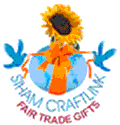 Producer Partners : Bangladesh
Producer Partners : BangladeshArtisan Talent
- About UsAbout Us
- Our ProductsOur Products
- InitiativesInitiatives
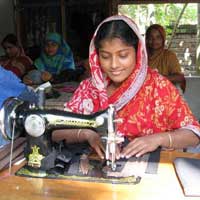 Artisan Talent is a Fair Trade organization in Bangladesh dedicated to creating handcraft employment for poor and disadvantaged producers. Training is provided to improve their skills and thereby increase opportunities for employment. Approximately 70% of the artisans are women. 50-80% advance payment is given for the purchase of raw materials and for the payment of wages. Artisan Talent is committed to empowering the poor, especially destitute women, through job creation and capacity earning. All Fair Trade values are respected and upheld.
Artisan Talent is a Fair Trade organization in Bangladesh dedicated to creating handcraft employment for poor and disadvantaged producers. Training is provided to improve their skills and thereby increase opportunities for employment. Approximately 70% of the artisans are women. 50-80% advance payment is given for the purchase of raw materials and for the payment of wages. Artisan Talent is committed to empowering the poor, especially destitute women, through job creation and capacity earning. All Fair Trade values are respected and upheld. Artisan Talent produces and exports date leaf baskets, hogla leaf baskets, recycled products, clay products, silk scarves, embroidered greeting cards, jute bags, leather jewelry boxes and toys.
Corr-the Jute Works
- About UsAbout Us
- Our ProductsOur Products
- InitiativesInitiatives
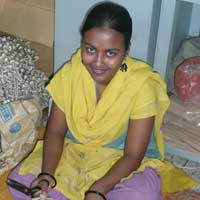 CORR-The Jute Works (CJW), a registered Fair Trade Trust in Bangladesh for producing and marketing handicrafts, was incepted in September, 1973. It is also a pioneer member of the World Fair Trade Organization (WFTO), previously known as IFAT. The initial aim was to provide rural marginalized women with work at home. The goal was not only to rehabilitate the women, but to create sustainable development with their family. CORR The Jute Works has provided the means for income generation for these groups of women through the production of handicraft items made out of a locally available raw material such as jute, grass, leaf, cane, bamboo and clay . During its 40 plus years journey, CORR The Jute Works has greatly assisted the socio-economic condition of poverty-stricken rural women artisans. The organization has a well-defined mission, vision and philosophy and now has 23 production areas in different areas of Bangladesh. Products are being exported to Europe, America, Australia and Asia.
CORR-The Jute Works (CJW), a registered Fair Trade Trust in Bangladesh for producing and marketing handicrafts, was incepted in September, 1973. It is also a pioneer member of the World Fair Trade Organization (WFTO), previously known as IFAT. The initial aim was to provide rural marginalized women with work at home. The goal was not only to rehabilitate the women, but to create sustainable development with their family. CORR The Jute Works has provided the means for income generation for these groups of women through the production of handicraft items made out of a locally available raw material such as jute, grass, leaf, cane, bamboo and clay . During its 40 plus years journey, CORR The Jute Works has greatly assisted the socio-economic condition of poverty-stricken rural women artisans. The organization has a well-defined mission, vision and philosophy and now has 23 production areas in different areas of Bangladesh. Products are being exported to Europe, America, Australia and Asia. Many of CJW’s products are made from jute, a sustainable fiber found abundantly in Bangladesh. CJW has been working with jute farmers who had begun to abandon their harvest because of low prices. Together, they are developing production of high quality, organic, Fair Trade jute that will benefit CJW and small farmers. Products include rugs, ornaments, scarves, pillows, baskets, planters, candles, vases and nativity scenes.
Hajiganj Handicrafts
- About UsAbout Us
- Our ProductsOur Products
- InitiativesInitiatives
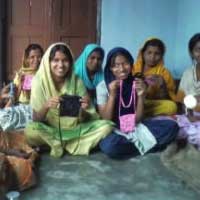 In 2006, it was noted by the staff of the Fair Trade Organization Prokritee that the village was in one of the poorest areas of Bangladesh. The people of the area had very limited education, no permanent work and hence, very low income. Women had virtually no opportunity to work outside of their household responsibilities although they had some knowledge of crochet work. Training was initiated with ten women to increase their skills to produce export quality products. These ten women then in turn started training other women and in 2006 Hajiganj Handicrafts was formed. As the international market for crochet work has fallen, the ladies now also make glorious recycled sari kantha throws and bedspreads.
In 2006, it was noted by the staff of the Fair Trade Organization Prokritee that the village was in one of the poorest areas of Bangladesh. The people of the area had very limited education, no permanent work and hence, very low income. Women had virtually no opportunity to work outside of their household responsibilities although they had some knowledge of crochet work. Training was initiated with ten women to increase their skills to produce export quality products. These ten women then in turn started training other women and in 2006 Hajiganj Handicrafts was formed. As the international market for crochet work has fallen, the ladies now also make glorious recycled sari kantha throws and bedspreads. Many of the items created by the women of Hajiganj Handicrafts have beautiful beadwork designed into the crochet pattern. Their range of products includes purses, mobile phone holders, girls’ caps, delicate bracelets and children’s toys. They also create sari kantha throws and bedspreads.
Prokritee
- About UsAbout Us
- Our GoalsOur Goals
- InitiativesInitiatives
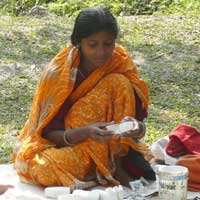 Prokritee (meaning ‘nature’ in Bangla) is a service based agency that provides managerial support, product design and development and marketing assistance to Fair Trade organizations in Bangladesh. Prokritee manages 8 Handicraft Enterprises and helps other groups to sell their products in local and foreign markets. All Fair Trade standards are upheld. Prokritee and its 8 enterprises provide jobs for poor rural women, widows, divorcees or head-of-households with little or no income. By providing employment, Prokritee is able to improve their standard of living and help them send their children to school. Now they are able to look at the future with hope and happiness, instead of poverty and despair. Prokritee was created by Mennonite Central Committee (MCC) in 2001 to independently manage the 8 job creation enterprises with its own management and organized structure. The enterprises are located in different parts of the country . Each enterprise is individually supervised by a Project Manager with the help of a Producer Management Committee (PMC). Prokritee, having its central office in Dhaka, markets the products made by the enterprises (and other like-minded groups not associated with MCC) through its marketing arms, which are termed as Export Marketing and Local Marketing. Prokritee has a design department, which helps the enterprises in combining the skill of the producers with the needs of customers. The design department is also committed to develop designs based on the cultural heritage of Bangladesh.
Prokritee (meaning ‘nature’ in Bangla) is a service based agency that provides managerial support, product design and development and marketing assistance to Fair Trade organizations in Bangladesh. Prokritee manages 8 Handicraft Enterprises and helps other groups to sell their products in local and foreign markets. All Fair Trade standards are upheld. Prokritee and its 8 enterprises provide jobs for poor rural women, widows, divorcees or head-of-households with little or no income. By providing employment, Prokritee is able to improve their standard of living and help them send their children to school. Now they are able to look at the future with hope and happiness, instead of poverty and despair. Prokritee was created by Mennonite Central Committee (MCC) in 2001 to independently manage the 8 job creation enterprises with its own management and organized structure. The enterprises are located in different parts of the country . Each enterprise is individually supervised by a Project Manager with the help of a Producer Management Committee (PMC). Prokritee, having its central office in Dhaka, markets the products made by the enterprises (and other like-minded groups not associated with MCC) through its marketing arms, which are termed as Export Marketing and Local Marketing. Prokritee has a design department, which helps the enterprises in combining the skill of the producers with the needs of customers. The design department is also committed to develop designs based on the cultural heritage of Bangladesh. The goals of Prokritee are threefold. To provide, create, promote and assist income generating projects that are operational and managed to benefit the producers, adhere to good safety and environmental standards and are or have the potential to become self reliant. To provide employment to women by hiring those who are had of households (widows, divorcees or separated), have little if any income, are landless with few or no assets or a primarily rural. To provide skill development through training to increase the skills of personnel within income generating enterprises.
Prokritee provides jobs for poor women in rural Bangladesh the majority being widows, divorcees or head-of-households with little or no income. By providing employment, the standard of living if the individual is greatly improved along with their families and communities. They are able to send their children to school, thus enabling them to look towards the future with hope and happiness instead of poverty and despair.
Shohojogita
- About UsAbout Us
- Our ProductsOur Products
- InitiativesInitiatives
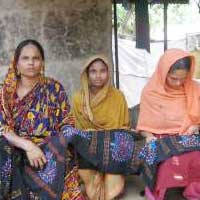
The organization Shohojogita is a Bangladesh word which means ‘helping each other’. The principal vision is to help rural, poor widowed, divorced and helpless women by creating employment for them. The concept basically came from the good feelings of love for the indigent people in the society.
Shohojogita is a non-profitable and non-government social development organization. It dreams of establishing a society free from exploitation, oppression and injustice where each individual will be able to live in peace and harmony with a fair share of resources belonging to the community. The major items produced in different areas of Bangladesh are glorious handwoven jute products and also a diverse hand embroidered collection.
Surjomukhi
- About UsAbout Us
- Our BenefitsOur Benefits
- InitiativesInitiatives
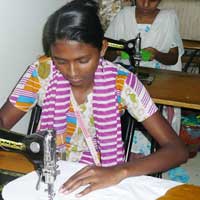
Surjomukhi, a fair trade organization, was founded in Bangladesh in 1994. In the formative years of Surjomukhi, the organization worked with an ethnic group named Garo from the Mymensingh district, about 120 kms north of Dhaka. Some of these ladies still work at Surjomukhi as well as artisans from Dhaka. All the artisans now live around Dhaka. Some of the artisans work from home and bring their finished products to the organization regularly. There is also a small production unit in Dhaka.
Surjomukhi has identified three difficulties for gainful employment by low income and marginalised people in the rural areas. They are lack of working capital, marketing support and opportunity for skills development. At Surjomukhi, the artisans have ongoing training to improve their skills and meet the challenges of innovativeness, design, efficiency and aesthetic taste. This organization specializes in the making of a tactile children’s collection including dressup costumes, puppets and soft toys.
YWCA
- About UsAbout Us
- Our ProductsOur Products
- Our GoalsOur Goals
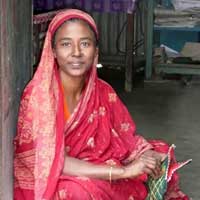 The YWCA Craft Centre was founded in 1973 to provide training in sewing and embroidery for women, many who had been abandoned or abused by their husbands. There are now about 450 ladies working for the YWCA Craft Centre. The main Craft Centre is in Dhaka, next to the YWCA School, but ladies also work around their daily chores in the peaceful rural Kalijong Village and Savar Village. Besides providing vital family income, the women also learn to read and write, have access to subsidized health care, a savings programme is in place and interest free loans.
The YWCA Craft Centre was founded in 1973 to provide training in sewing and embroidery for women, many who had been abandoned or abused by their husbands. There are now about 450 ladies working for the YWCA Craft Centre. The main Craft Centre is in Dhaka, next to the YWCA School, but ladies also work around their daily chores in the peaceful rural Kalijong Village and Savar Village. Besides providing vital family income, the women also learn to read and write, have access to subsidized health care, a savings programme is in place and interest free loans.
The ladies make a diverse range of colourful items sewn by hand in cotton poplin onto jute material. There are rooms at the Centre as in the villages where the ladies complete the products by sewing them together on treadle sewing machines. The diverse range of handpuppets, wall pocket tidies, soft toys decorations and decor items are all very unique and spectacular.
